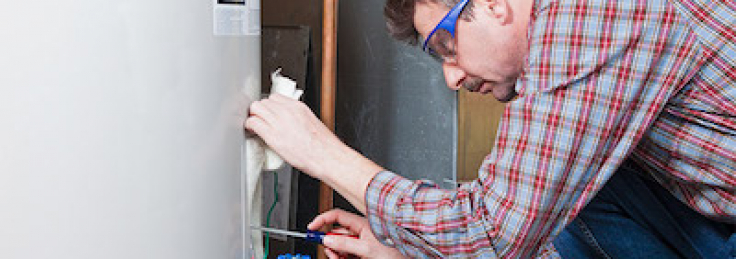Troubleshooting Standard Heater Challenges
Troubleshooting Standard Heater Challenges
Blog Article
The author is making a number of great pointers related to Common Problems with Tank Water Heaters in general in this great article down the page.

Visualize beginning your day without your routine hot shower. That already sets a bad tone for the remainder of your day.
Every house requires a dependable hot water heater, yet just a few know how to handle one. One very easy way to keep your water heater in leading shape is to look for faults frequently as well as repair them as soon as they appear.
Remember to turn off your water heater prior to smelling around for faults. These are the water heater faults you are probably to run into.
Water too hot or also cold
Every hot water heater has a thermostat that determines just how warm the water gets. If the water entering into your home is also hot regardless of establishing a hassle-free maximum temperature, your thermostat could be malfunctioning.
On the other hand, too cold water might be due to a failed thermostat, a busted circuit, or improper gas flow. For instance, if you use a gas hot water heater with a busted pilot burner, you would certainly obtain cold water, even if the thermostat is in best condition. For electric heating units, a blown fuse may be the wrongdoer.
Inadequate hot water
Hot water heater come in several dimensions, depending upon your hot water needs. If you run out of warm water prior to everybody has actually had a bathroom, your hot water heater is too little for your family size. You need to think about installing a larger water heater container or choosing a tankless water heater, which takes up much less space as well as is extra long lasting.
Odd sounds
There are at least five sort of sounds you can speak with a water heater, however one of the most usual analysis is that it's time for the water heater to retire.
First off, you need to know with the typical appears a hot water heater makes. An electric heating unit might appear various from a gas-powered one.
Popping or banging audios usually imply there is a piece of sediment in your storage tanks, and also it's time to cleanse it out. On the other hand, whistling or hissing noises may simply be your valves letting some pressure off.
Water leaks
Leaks might come from pipelines, water links, valves, or in the worst-case scenario, the tank itself. With time, water will certainly rust the tank, and locate its way out. If this takes place, you need to replace your hot water heater immediately.
However, prior to your change your entire storage tank, be sure that all pipes remain in place and that each shutoff functions completely. If you still require help determining a leakage, call your plumber.
Rust-colored water
Rust-colored water means one of your water heater components is corroded. It could be the anode pole, or the tank itself. Your plumber will be able to determine which it is.
Warm water
Despite how high you set the thermostat, you will not obtain any kind of warm water out of a heater well past its prime. A water heater's performance might decrease with time.
You will also get lukewarm water if your pipes have a cross connection. This implies that when you switch on a tap, warm water from the heating unit moves in alongside routine, cold water. A cross link is very easy to area. If your warm water taps still follow shutting the hot water heater shutoffs, you have a cross link.
Discoloured Water
Rust is a significant root cause of dirty or discoloured water. Rust within the water tank or a falling short anode rod might create this discolouration. The anode rod protects the tank from rusting on the within and should be examined annual. Without a rod or a correctly operating anode pole, the hot water promptly corrodes inside the tank. Get in touch with an expert hot water heater service technician to figure out if changing the anode pole will repair the problem; if not, change your hot water heater.
Final thought
Ideally, your water heater can last 10 years prior to you need a modification. Nonetheless, after the 10-year mark, you may experience any of these mistakes a lot more frequently. At this moment, you need to add a brand-new water heater to your budget.
How To Troubleshoot 3 Common Water Heater Problems in Twin Cities
The Water Heater Is Leaking
A leaky cold water inlet valve A loose pipe fitting A leaky temperature and pressure relief valve A corroded anode rod A cracked tank Turn Off Your Water Heater:
Shut off your gas water heater by turning the gas valve on the unit to the “OFF” position. Shut off your electric water by switching its power off at your electrical panel. Look for a two-pole breaker labeled “water heater” and turn it to the “OFF” position. Move the ball valve connected to the water heater to be perpendicular to the piping at a 90° angle. Look for the Leak:
Depending on whether the water is coming from the tank's top or bottom, you’ll want to look for the leak in different locations.
If the leak comes from the top of the tank, carefully look for water escaping from the cold water inlet valve or loose pipe fittings. Rusted hot and cold water valves can have loose connections with the tank, with water leaking out of them.
https://mspplumbingheatingair.com/blog/how-to-troubleshoot-3-common-water-heater-problems
As a passionate reader on Common Problems with Your Home Water Heater, I was thinking sharing that blog post was worthwhile. I beg you set aside a second to promote this post if you liked it. We truly appreciate reading our article about Water Heater Repair and Troubleshooting.
Save time, dial! Report this page